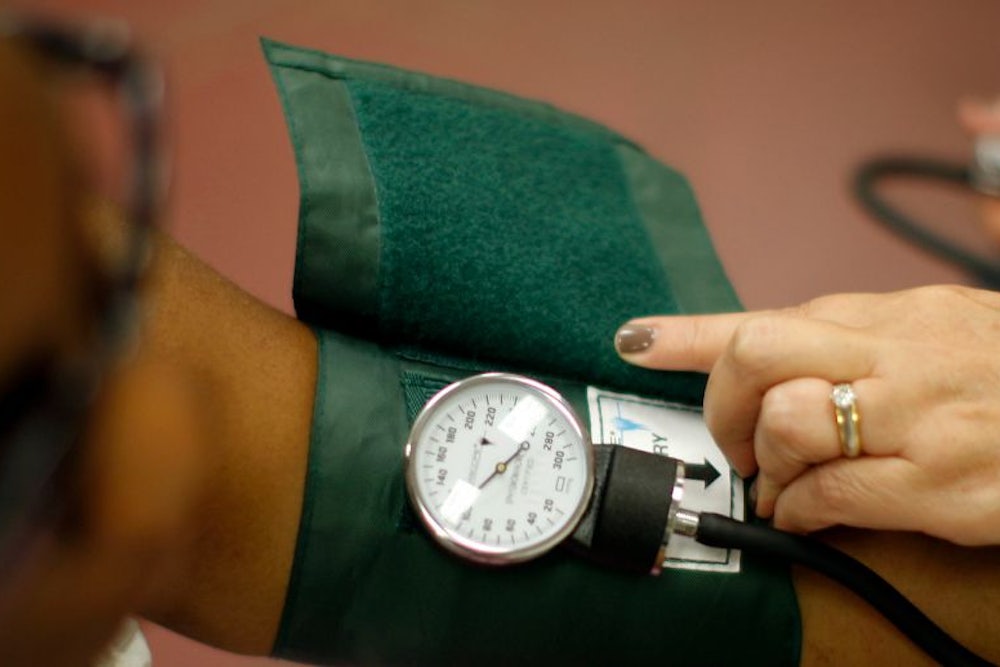Pundits of many shades of opinion have wondered at the recklessness of the Eisenhower Administration in inviting the massive retaliation of old people by torpedoing the Forand bill that would have provided medical care for persons over 65 by raising social security payments. The usual comment is that there are 16 million Americans now past 65, and the vast majority of them are voters.
Nor is that all. An aged and ailing parent is a burden on many an American who is under 65—just how many nobody knows, but probably several millions. Their resentment may be even more bitter and lasting than that of the old folks themselves, and it will not be directed exclusively toward the Republican politicians. Eisenhower, always adept at taking shelter when the political shell-fire begins to register on his position, has a splendid dug-out in the American Medical Association. He has already made it plain that he is supporting the profession in opposing “socialized medicine.” And Nixon has said, “Me, too.”
Accordingly, the profession itself must bear in part the onus of defeating the effort to ease what is not merely a burden on millions of families but one charged with a terrific emotional potential. When a man can feel that his wrath is righteous he is implacable indeed. A wage-earner, already pinched by the high cost of living, would be sunk completely by the surgical and hospital bill for repairing Grandpap’s slipped disc; yet the old man will stoically bear the misery in his back rather than incur the humiliation of entering the charity wards. If he had a right to treatment, as a senior citizen, he would take it; but he prefers pain to charity.
The son’s attitude, naturally, is that Eisenhower, by advice of the AMA, has condemned the old man to suffering, either in his body or in his pride. So the profession, as well as the politician, is the object of an indignation that the son feels is disinterested - not for himself, but for Grandpap.
The sophisticated can draw a distinction between the association and the profession. The voice of any tightly organized body is seldom the voice of its membership, but rather that of a politically-minded group who have obtained control; and doctors are not different, in this respect, from veterans, or union men, or Daughters of the American Revolution. But the sophisticated are a minority. To the masses the AMA means all doctors.
Even the sophisticated, however, respond with a mild irritation to the use of the words “socialized medicine” as a sort of incantation. What other kind of medicine is practiced by any reputable physician. Hippocrates, not Eisenhower, socialized medicine when he swore his students to put the welfare of the patient ahead of their own profit. If the time ever comes when American medicine is not socialized, it will no longer be a profession, but merely a pill-peddlers’ syndicate, commanding no more public respect than the Pants Pressers’ Protective League. There are, to be sure, physicians—some of them highly skilled—who have become fee-seekers first and social servants afterward. But every one of that stripe is a blot upon the profession, more heartily condemned by his colleagues than by laymen.
It is curious to see how the history of such private organizations as the Blue Shield and the Blue Cross has been misinterpreted. Every one of these was originally organized on what was supposed to be a sound actuarial basis; but without important exception they have been compelled steadily to raise their rates. The response or the conservatives has been a great outcry against chiseling; but the alleged chiseling seems to be that the insurance plan has encouraged people to apply for medical or hospital care when they are only moderately ill, not when they are perfectly healthy. What the experience of these plans really proves is that the actuarial basis was wrong - that vast numbers of people who need medication or surgery have been going without it as long as their cases were not desperate.
If every citizen over 65 votes Democratic in November, it is a safe bet that the Republican Party will see the error of its ways and will reform speedily. The damage it suffers will probably be confined to one election. The resentment that the medical profession is stirring up cannot have any such spectacular expression, but for that very reason it may linger much longer. Perhaps it will not amount to much; but perhaps it will create a distrust that may be turned to account by demagogues who will persuade the people to vote to governmental interference with medical practice that will be really objectionable.
